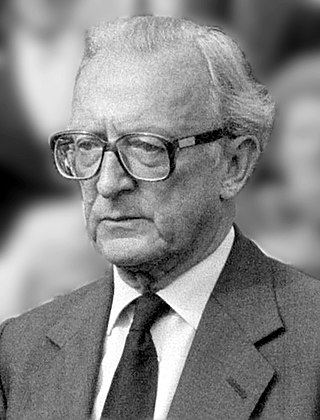
Peter Alexander Rupert Carington, 6th Baron Carrington, Baron Carington of Upton,, was a British Conservative Party politician and hereditary peer who served as Defence Secretary from 1970 to 1974, Foreign Secretary from 1979 to 1982, Chairman of the General Electric Company from 1983 to 1984, and Secretary General of NATO from 1984 to 1988. In Margaret Thatcher's first government, he played a major role in negotiating the Lancaster House Agreement that ended the racial conflict in Rhodesia and enabled the creation of Zimbabwe.

Lords of Appeal in Ordinary, commonly known as Law Lords, were judges appointed under the Appellate Jurisdiction Act 1876 to the British House of Lords, as a committee of the House, effectively to exercise the judicial functions of the House of Lords, which included acting as the highest appellate court for most domestic matters.

Field Marshal Edwin Noel Westby Bramall, Baron Bramall, was a British Army officer. He served as Chief of the General Staff, the professional head of the British Army, between 1979 and 1982, and as Chief of the Defence Staff, professional head of the British Armed Forces, from 1982 to 1985.

John Clarke MacDermott, Baron MacDermott,, PC (NI), was a Northern Irish politician, barrister, and judge who served as Attorney-General for Northern Ireland, a Lord of Appeal in Ordinary, and Lord Chief Justice of Northern Ireland. He was the first law lord to be appointed from Northern Ireland.
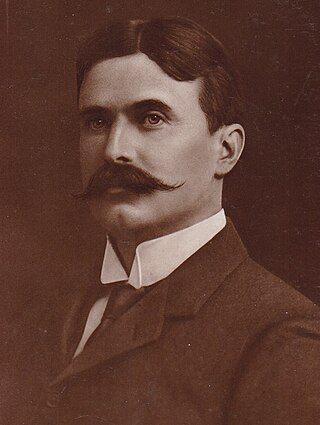
William Robert Wellesley Peel, 1st Earl Peel,, 2nd Viscount Peel from 1912 to 1929, was a British politician who was a local councillor, a Member of Parliament and a member of the House of Lords. After an early career as a barrister and a journalist, he entered first local and then national politics. He rose to hold a number of ministerial positions but is probably best remembered for chairing the Peel Commission in 1936–1937, which recommended for the first time the partition of the British Mandate of Palestine into separate Jewish and Arab states.
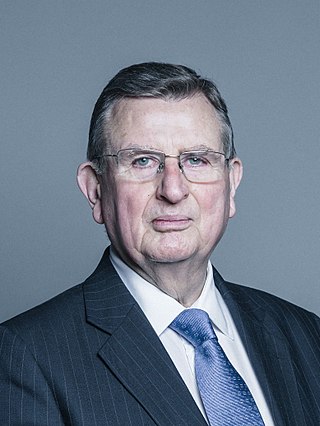
Peter Spencer Bowness, Baron Bowness, is a British politician, solicitor, and life peer. Since 1996, he has been a member of the House of Lords.
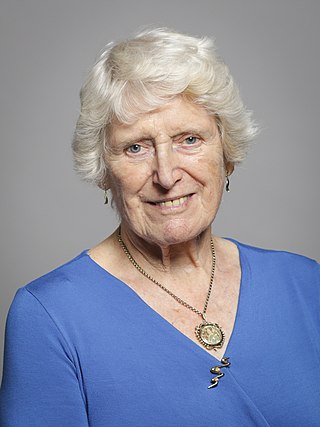
Ann Elizabeth Oldfield Butler-Sloss, Baroness Butler-Sloss, GBE, PC, is a retired English judge. She was the first female Lord Justice of Appeal and was the highest-ranking female judge in the United Kingdom until 2004, when Baroness Hale was appointed to the House of Lords. Until June 2007, she chaired the inquests into the deaths of Diana, Princess of Wales, and Dodi Fayed. She stood down from that task with effect from that date, and the inquest was conducted by Lord Justice Scott Baker.

Jonathan Hugh Mance, Baron Mance, is a retired British judge who was formerly Deputy President of the Supreme Court of the United Kingdom.
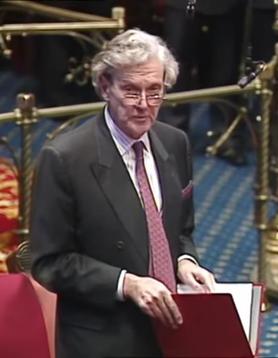
Gordon Slynn, Baron Slynn of Hadley was a British judge and Advocate General of the European Court of Justice. He particularly specialised in European law. He was a Lord of Appeal in Ordinary.

Cyril Asquith, Baron Asquith of Bishopstone, PC was an English barrister and judge who served as a Lord of Appeal in Ordinary from 1951 until his death three years later.

Jocelyn Edward Salis Simon, Baron Simon of Glaisdale, was a Law Lord in the United Kingdom, having been, by turns, a barrister, a commissioned officer in the British Army, a barrister again, a Conservative Party politician, a government minister, and a judge.
Major Charles Murray Kennedy St Clair, 17th Lord Sinclair, CVO, DL was a Scottish peer who spent his entire life in the service of the Crown; as a soldier, an officer of arms, an equerry in the Queen Mother's Household, a representative peer and as a Lord Lieutenant.

Simon Denis Brown, Baron Brown of Eaton-under-Heywood, was a British barrister and judge. He was a Law Lord, then a Justice of the Supreme Court of the United Kingdom from 2009 to 2012.

Robert Douglas Carswell, Baron Carswell,, was a British barrister and judge who served as Lord Chief Justice of Northern Ireland and a Lord of Appeal in Ordinary.

Michael John Mustill, Baron Mustill, PC, FBA was an English barrister and judge. He was a Lord of Appeal in Ordinary from 1992 to 1997.

Robert Younger, Baron Blanesburgh, was a British barrister and judge. The scion of a Scottish brewing family, he practised at the bar of England and Wales, before being appointed to the High Court in 1915, the Court of Appeal in 1919, and the House of Lords in 1923. He served as a law lord until 1937, when failing eyesight forced his retirement.

Fergus Dunlop Morton, Baron Morton of Henryton, MC, PC was a British barrister and judge who was a Lord of Appeal in Ordinary from 1947 to 1959. The son of a Scottish stockbroker, Morton was educated in Scotland and England, before being called to the English bar. After serving with the British Army in the First World War, during which he won the Military Cross, he developed a successful Chancery practice. He was appointed to the High Court in 1938, promoted to the Court of Appeal in 1944, and to the House of Lords in 1947, retiring from judicial service in 1959.
Sir Stephen Brown GBE, PC is a British retired judge. He was a Lord Justice of Appeal and the President of the Family Division of the High Court of England and Wales.

Harald Robert Leslie, Lord Birsay, KT, CBE, TD, DL was a Scottish lawyer and judge, and Chairman of the Scottish Land Court.
Sir Clifford John Boulton, was a senior official in the Parliament of the United Kingdom. From 1987 to 1994, he was the Clerk of the House of Commons.

















